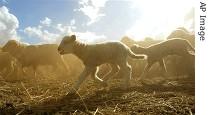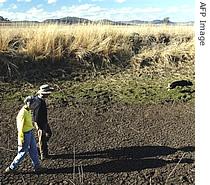2007年VOA标准英语-Drought, Floods Fuel Australian Climate Change(在线收听)
Goulburn, Australia
05 July 2007
A long drought and recent floods have intensified debate in Australia over climate change. Many Australians believe man's reliance on fossil fuels is warming the earth, while skeptics say it is all part of a natural cycle. Phil Mercer reports on Australia's climate change debate from a sheep farm near the outback town of Goulburn in New South Wales.
 |
| Australian merino sheep (file photo) |
It enters the soil through a process called photosynthesis, where plants convert carbon dioxide into sugars.
Turner says having large stretches of healthy pasture is good for the environment and improves the quality of the soil and the feed it produces.
"There is a total win-win situation between improving your soil carbon level and taking carbon dioxide out of the atmosphere," he said. "The significance and value of this is grossly under-estimated because 75 percent of the carbon in the biosphere - that's the soil, the grass, the trees - 75 percent of the carbon is in the soil, not in the trees, and it's not being properly examined."
Many scientists around the world think gas emissions from fossil fuels such as oil and coal contribute to global warming. They say one way to reduce the problem is through naturally offsetting carbon dioxide emissions by planting trees and protecting grasslands.
It seems that many Australian farmers see that as an opportunity. There could well be good economic incentives to plant trees and to carefully manage pastures.
Biologist Charlie Warren from the University of Sydney says that farmland could become an important part of a carbon-trading program. In these programs, companies and individuals that produce carbon emissions, trade credits, or emissions rights, with those who pollute less, or can absorb emissions.
"I guess the big thing now is that a lot of farmers are seeing the value of their land as maybe a sink for carbon, maybe actually being able to sell it as a carbon sink," he said. "Essentially it would be a tradable carbon offset so you could drive around in your big four-wheel drive and you can get someone to plant some trees which will soak up the carbon. Basically the farmer would sell the carbon which is stored on his land so if a farmer converts some grassland to a forest he can sell the extra carbon that's stored there."
 |
| Australian farmers survey a dry creek bed on their drought stricken 100-hectare property near Toowoomba, west of Brisbane (File photo) |
Not everyone, though, is convinced.
Tony Morrison is a livestock farmer near Goulburn. Like some scientists, he thinks the drought is part of a natural cycle.
"Of course it's climate change but the question is whether or not it's man-induced climate change and I don't believe it is," he said. " I think it's quite ludicrous to consider that man can exert more influence on the climate than nature. I certainly wouldn't be predicting that this is the end of a drought. I would say we're in part of a 40 to 50 year dry-ish cycle in eastern Australia."
Australians are among the world's worst polluters per capita, because of their reliance on cars. And many fear their cars are accelerating climate change.
This young woman in Sydney says she walks everywhere she can, instead of taking a car or bus.
"I want the world to be a better place for everyone to live in. (For) people that are here after all of us, as well. It's about not just thinking about you," she noted. "It's about thinking about the rest of the world that are here now and also people that will be here in the future."
Many Australians think they could - and should - be doing more to protect the environment and reduce emissions. It is difficult to find anyone here in Sydney who is not at least recycling rubbish or cutting electricity and water use.
The common view is that if climate change is not addressed urgently a warmer future will make this country, already prone to drought and cyclones, an increasingly tough place to live and prosper.